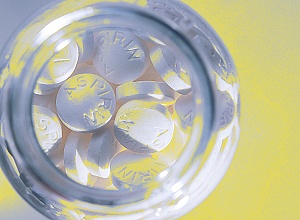Aspirin is an established, safe, and low-cost medication in long-standing common use in prevention and treatment of cardiovascular diseases, and in the past a pain relief and fever reducing medication. The use of aspirin was very popular during the 1918 Spanish Influenza pandemic, several decades before in-vitro confirmation of its activity against RNA viruses. Studies showed that aspirin, in addition to its well-known anti-inflammatory effects, could modulate the innate and adaptive immune responses helping the human immune system battle some viral infections.
With this information in mind Israeli researchers hypothesised that pre-infection treatment with low-dose aspirin (75mg) use might have a potential beneficial effect on COVID-19 susceptibility and disease duration. A joint team from Leumit Health Services, Bar-Ilan University, and Barzilai Medical Centre conducted an observational epidemiological study, utilising data from Leumit Health Services, a national health maintenance organisation in Israel.
The researchers analysed data of 10,477 persons who had been tested for COVID-19 during the first COVID-19 wave in Israel from 1 February, 2020 to 30 June, 2020.
Aspirin use to avoid the development of cardiovascular diseases in healthy individuals was associated with a 29% lower likelihood of COVID-19 infection, as compared to aspirin non-users. The proportion of patients treated with aspirin was significantly lower among the COVID-19-positive individuals, as compared to the COVID-19-negative ones.
And those subjects who had been treated with aspirin were less associated with the likelihood of COVID-19 infection than those who were not. Moreover, the group observed that the conversion time of SARS-CoV-2 PCR test results from positive to negative among aspirin-using COVID-positive patients was significantly shorter, and the disease duration was two-three days shorter, depending upon the patients' pre-existing conditions.
"This observation of the possible beneficial effect of low doses of aspirin on COVID-19 infection is preliminary but seems very promising," says Professor Eli Magen from the Barzilai Medical Centre, who led the study.
Study principal investigator Dr Eugene Merzon, from Leumit Health Services, emphasises the importance of repeating the study results using larger samples, and including patients from other hospitals and countries, to verify the results.
Dr Milana Frenkel-Morgenstern, of the Azrieli Faculty of Medicine of Bar-Ilan University: "The present study sought to better understand the potential favourable effects of aspirin in aiding the human immune system battle COVID-19. We intend to investigate a larger cohort of patients and in randomized clinical trials."
Study details
The use of aspirin for primary prevention of cardiovascular disease is associated with a lower likelihood of COVID‐19 infection
Eugene Merzon, Ilan Green, Shlomo Vinker, Avivit Golan‐Cohen, Alessandro Gorohovski, Eva Avramovich, Milana Frenkel‐Morgenstern, Eli Magen
Published in The FEBS Journal on 23 February 2021
Abstract
Acetylsalicylic acid (aspirin) is commonly used for primary and secondary prevention of cardiovascular diseases. Aspirin use is associated with better outcomes among COVID‐19 positive patients. We hypothesized that aspirin use for primary cardiovascular disease prevention might have a protective effect on COVID‐19 susceptibility and disease duration. We conducted a retrospective population‐based cross‐sectional study, utilizing data from the Leumit Health Services database. The proportion of patients treated with aspirin was significantly lower among the COVID‐19‐positive group, as compared to the COVID‐19‐negative group (73 (11.03 %) vs. 1548 (15.77%); p=0.001). Aspirin use was associated with lower likelihood of COVID‐19 infection, as compared to non‐users (adjusted OR 0.71 (95% CI, 0.52 to 0.99; p=0.041). Aspirin users were older (68.06 ± 12.79 vs. 56.63 ± 12.28 years of age; p<0.001), presented a lower BMI (28.77±5.4 vs. 30.37±4.55; p<0.0189) and showed higher prevalence of hypertension (56, 76.71%), diabetes (47, 64.38%) and COPD (11, 15.07%) than showed the aspirin non‐users (151, 25.64%, p<0.001; 130, 22.07%, p<0.001; and 43, 7.3%, p=0.023, respectively). Moreover, COVID‐19 disease duration (considered as the time between the first positive and second negative COVID‐19 RT‐PCR test results) among aspirin users was significantly shorter, as compared to aspirin non‐users (19.8±7.8 vs. 21.9± 7.9 p= 0.045). Among hospitalized COVID‐positive patients, a higher proportion of surviving subjects were treated with aspirin (20, 19.05%), as opposed to 1 dead subject (14.29%), although this difference was not significant (p=0.449). In conclusion, we observed inverse association between the likelihood of COVID‐19 infection, disease duration and mortality and aspirin use for primary prevention.
[link url="https://www.biu.ac.il/en/news/8919"]Bar-Ilan University material[/link]
[link url="https://febs.onlinelibrary.wiley.com/doi/10.1111/febs.15784"]The FEBS Journal study (Restricted access)[/link]

